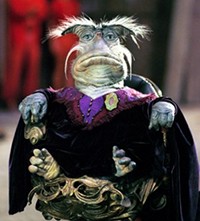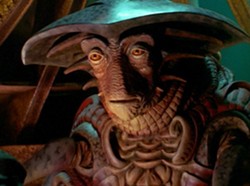RYGEL
I’m nobody’s puppet!
This outraged protest is of course a tongue-in-cheek joke aimed at the audience, because Rygel is indeed a puppet, although a very sophisticated one. Or rather, a combination of animatronics and voice work (from the talented Jonathan Hardy, who sadly passed away some time ago) that gives birth to a fully-rounded, many-faceted, totally believable character. Like his counterpart Pilot, Rygel makes us forget very quickly that he’s not really there, that he’s not a living creature – and that’s no mean feat…
Alien creatures in Farscape are truly alien, even the humanoid ones – i.e. the actors transformed by makeup and/or prosthetics – because the attention to detail of the show’s creators does not stop at skin level, but goes deeper, bestowing them with outlandish personalities and customs. This is even truer for the artificial actors (my preferred term to indicate the animatronics constructs), where the skill of the Jim Henson Company’s teams literally breathes life into these combinations of latex and mechanisms.
Rygel is a shining example of that skill: small, froglike, ugly, with a nasty temper and an insatiable appetite, he behaves like the deposed ruler that he is, lording it over his companions and making no mystery of his low consideration of them. Despite these unsavory traits, the former Hynerian Dominar endears himself to the viewers thanks to his shrewdness and deep wisdom: he’s the one who knows how to cut the best deals, or to take advantage of difficult situations. He is a survivor, and it soon becomes clear that he’s learned this talent in the hardest possible way.
Once the ruler of six billion people, Rygel has been deposed by a coup and imprisoned by the Peacekeepers at the behest of his rival – and not just imprisoned but tortured, both in mind and body, for the best part of 300 cycles. Once this fact comes to light, through Rygel’s confrontation with his former torturer, one has to wonder how he could have survived so much torment with his sanity intact, so that it’s easy to forgive him for the deep self-centeredness he exhibits in every circumstance: it’s plain that it’s what helped him to survive.
And survival is a skill that Rygel has honed to perfection: toward the end of the first season he has no qualms about abandoning his companions when the situation looks untenable, to the point of almost betraying them to save his skin, only to recant simply because a better (and safer!) option looms on the horizon. There are no “better angels” in Rygel’s psychological make up, no discovery of higher ideals: what still makes him a likable figure in the audience’s eyes is his total, brutal honesty about it. This open-faced admission is followed by one of my favorite scenes in the show: Crichton chides him for not doing “the right thing”, then forgives him with a kiss on the forehead, an act that leaves Rygel both stunned and contrite, in an incredible show of emotions that is even more amazing for being displayed by an artificial construct.
Of course Rygel changes with the passing of time, everyone aboard Moya does to some extent: at one point he even puts himself at risk to hold a defensive position in support of his crewmates, and sees it not as personal bravery but as paying homage to his noble ancestors. Yet what I most enjoy about his character is that he never effects a 360 degree psychological U-turn: sure, he does integrate in the Leviathan’s haphazard family, risking his life for them as I said above (not without grumbling, of course), but still he retains that exquisitely selfish nature that is his first and strongest barrier against the universe. When all is said and done, Rygel is still the delightfully double-dealing, greedy and self-centered creature we see in the first episode. And that’s the main reason we love him…
PILOT
“I wanted to see the stars…”
If Rygel represents the soul of greed, Pilot looks like the exact opposite: bonded to the Leviathan Moya, he shares with her the safekeeping of the crew, acting as intermediary between them and the ship. Yet Pilot (whose voice is that of Lani Tupu, who also portrays Captain Crais), despite his mild attitude and big, soulful eyes (one of his best life-like details), is not exactly a kind and selfless creature.
For example, he’s sometimes prone to sneering replies that show a seldom-seen facet of his character, one that surfaces in moments of stress: even without knowing his past history, it’s not surprising that he would take exception, now and then, to the cavalier attitude the Moyans employ in relating to him, treating him like some sort of glorified software interface, or worse – as it happens when they cut off one of his four arms as payment to a deranged scientist in exchange for star charts. Their rationalization of this terrible act is that “he’s a servicer” and that, in time, the arm will grow back, and in his deceptively effacing way Pilot seems to accept this – but reading between the lines of his comments we can hear barely repressed bitterness and open scorn.
 Yet he doesn’t lash out in retaliation: first because he’s physically tied to his console (“I don’t get out much, so I read”, is another of the memorable descriptions of his condition) and therefore unable to move about, and second because he carries a huge burden of guilt for the past actions that brought him where he is. When he was younger, he longed to explore space as the symbiotic companion of a Leviathan, but his elders deemed him still too young and inexperienced and counseled more patience: with typical youthful rashness, he chose a shortcut and accepted to be bonded with a Leviathan – Moya – as replacement for the original Pilot who did not want to participate in a Peacekeeper genetic experiment. Which of course meant the death, or rather the brutal assassination of that other Pilot at the hands of the Peacekeepers.
Yet he doesn’t lash out in retaliation: first because he’s physically tied to his console (“I don’t get out much, so I read”, is another of the memorable descriptions of his condition) and therefore unable to move about, and second because he carries a huge burden of guilt for the past actions that brought him where he is. When he was younger, he longed to explore space as the symbiotic companion of a Leviathan, but his elders deemed him still too young and inexperienced and counseled more patience: with typical youthful rashness, he chose a shortcut and accepted to be bonded with a Leviathan – Moya – as replacement for the original Pilot who did not want to participate in a Peacekeeper genetic experiment. Which of course meant the death, or rather the brutal assassination of that other Pilot at the hands of the Peacekeepers.
Once this detail of his past is revealed, many tiles fall in place, and we understand how the loss of one arm, or the constant pain he’s enduring because of the forced bond with a grieving Moya, are seen as the acceptable price for the freedom of the stars – and as the atonement Pilot feels is due to his predecessor. This is one of the best features of Farscape, that none of its characters is totally good or evil, that they all have some stain on their past, that they are flawed and imperfect. Just like us.
I have spoken of Pilot’s special bond with Aeryn when detailing her character: these are indeed my favorite moments in the show, the growing respect and affection that build between two very different beings who nonetheless manage to complement each other. They are both alone and isolated: Aeryn because of the severed ties to her Peacekeeper heritage, Pilot because his unmovable position at the heart of ship’s operations forces him to remain removed from all direct contact, unless the crew choses to visit him in his den – a huge, cavernous place that seems to dwarf even his far-from-slight frame. With hindsight, the infusion of Pilot’s DNA in Aeryn’s body looks like the first piece of the bridge that builds between them, linking the two in more ways than one: a physical merging that becomes a soul bond and a family tie, one of Farscape‘s underlying concepts – that “everything begins with family”.


I could just run away with Pilot – well if he had legs!
Both Rygel and Pilot were better actors than a lot of other human ones I have seen. They eyes and multitude of expressions are just staggering.
You just have to bow to the Henson Company’s artistry when “puppets” manage to make you cry and empathize with them on a regular basis!
LikeLike
They might be artificial, but they have a soul – that’s why they manage to touch us so deeply…
As for running away with Pilot… well, how about borrowing Rygel’s throne-sled? 😉
LikeLike